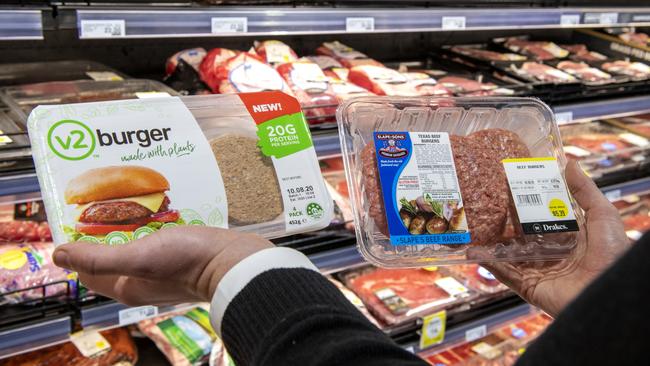Fake meats “healthier” than red meat products, new report claims
Fake meat products have been touted as being a healthier option than their red meat counterparts in a recent report. But is it fair to compare fresh meat with a processed food product?

COMPANIES producing fake meat alternatives are simply substituting one highly processed food for another, and should not be comparing fake meat with fresh meat products.
That’s according to Matthew Evans, former chef and host of Gourmet Farmer who operates Fat Pig Farm in the Huon Valley, Tasmania.
A report last week by alternative food think-tank Food Frontier claimed most plant-based meats have lower or comparable kilojoules and sodium, higher or comparable protein, and lower fat and saturated fats per 100 grams compared with conventional meat equivalents. But Mr Evans said simply comparing a processed meat-alternative product with a processed meat product was using “1920s nutrition” principles.
“If I was to look at the nutrition density of a carrot, or any product, looking at the fat, the carbohydrates, the sugars and the fibres, that is a very simplistic way of looking at it,” Mr Evans said.
“What they’re effectively trying to replace is one form of probably low grade meat, a processed meat product, with another processed food.
“People have the choice whether to eat meat or not. I personally find a lot of the character in meat more satisfying than any of the meat substitutes. I can eat vegan food, but I get more pleasure from the non-processed foods rather than the processed food.”
A study by market research agency Colmar Brunton showed 42 per cent of Australians are eating less meat, with six in 10 Australians having plant-based meats.
Food Frontier chief executive Thomas King said dietitians, health practitioners and consumers needed to understand whether plant-based meats were a healthier alternative to similar meats.
“Considering health is the top motivator for Aussies seeking to eat less meat, and with the local plant-based meat category reaching critical mass, more consumers are naturally asking whether these alternatives make for a healthier swap,” he said.
“This report provides an evidence-based, data-driven analysis to answer questions on nutrition, processing, ingredients and more, and brings context to the conversation by unpacking how plant-based meats compare to conventional meats in equivalent formats.”
Weighing the benefits: Consumers have been cautioned about the supposed dietary benefits of processed meat-alternative products.
MORE



